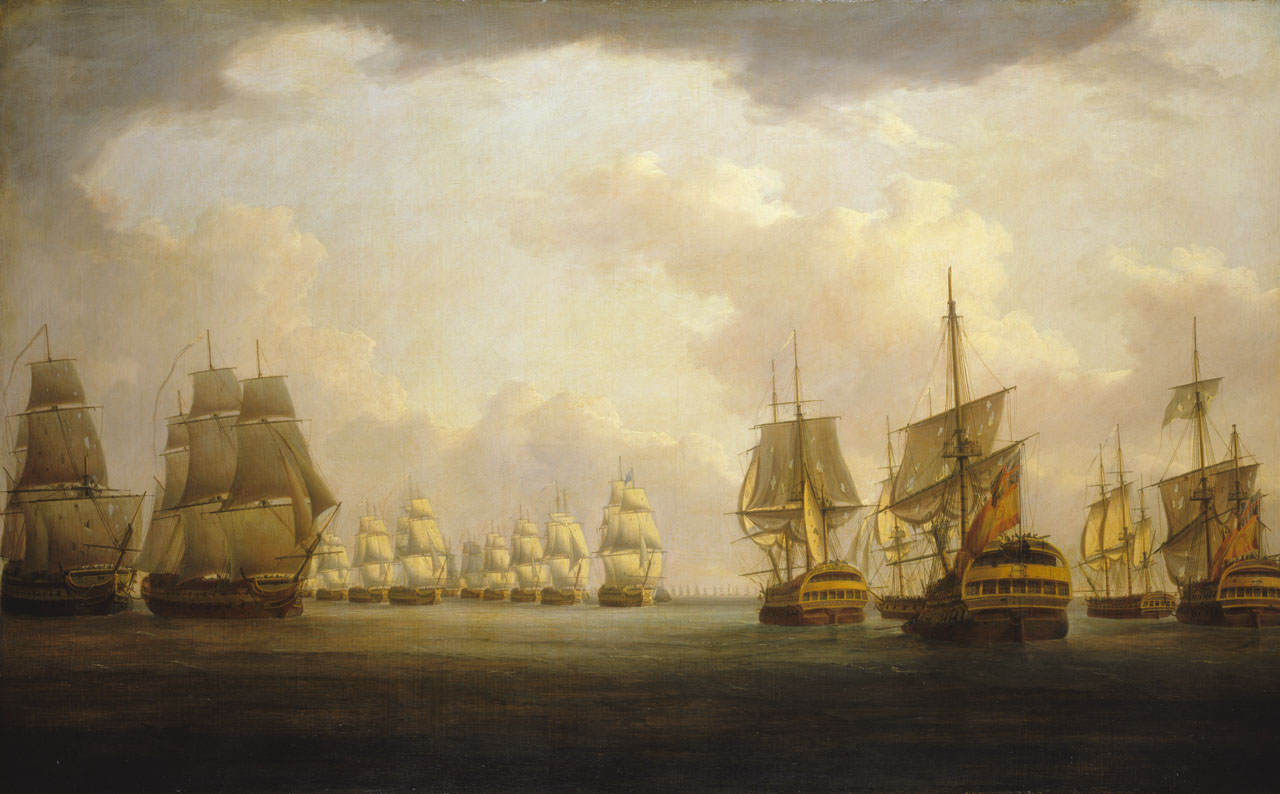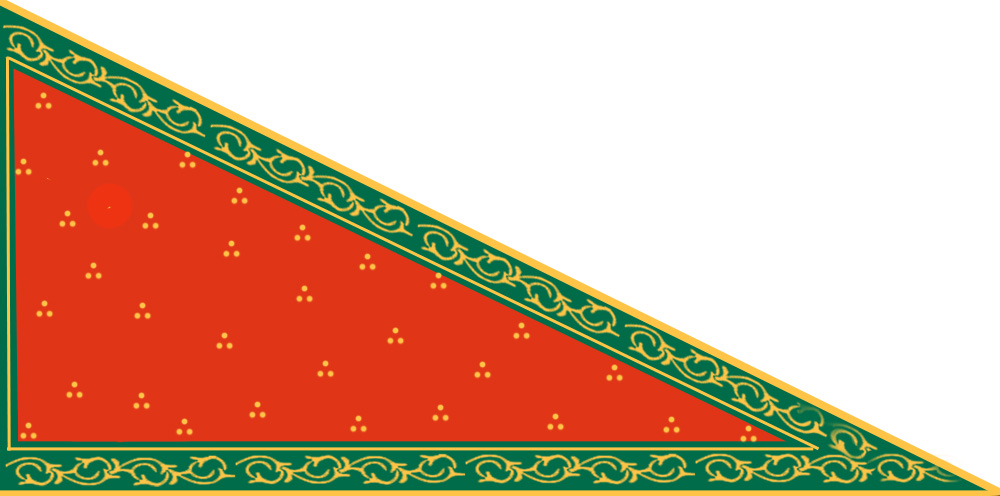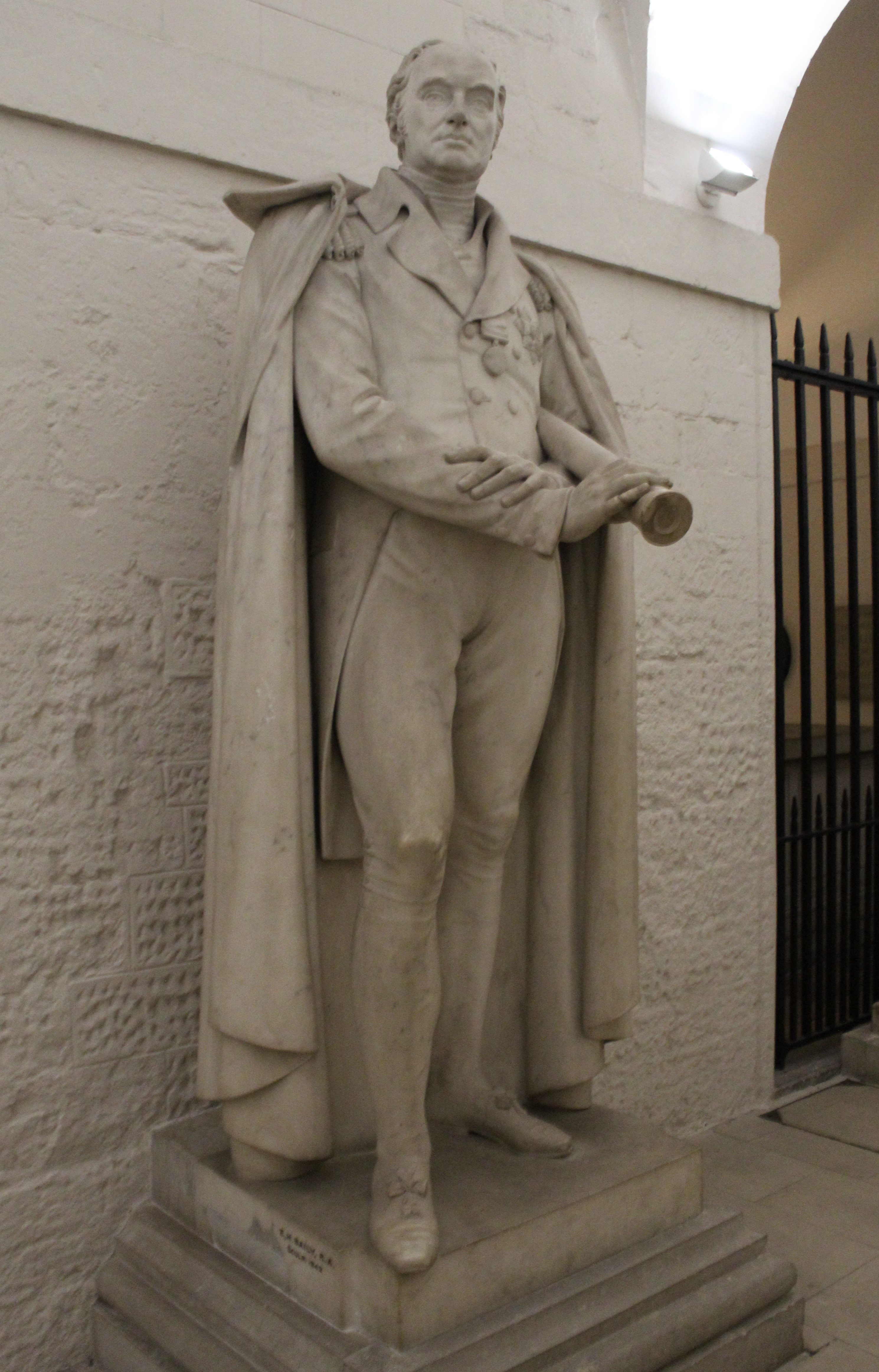|
William Fullerton-Elphinstone
William Fullerton-Elphinstone (born William Elphinstone; 13 September 1740 – 3 May 1834) was a Scottish ship's captain for the East India Company who became a director of the company several times between 1786 and 1824, and who served both as deputy chairman and chairman of the company. Life He was born William Elphinstone in Stirlingshire, the third son of Charles Elphinstone, 10th Lord Elphinstone, and his wife Lady Clementina Fleming. His younger brother was George Elphinstone, 1st Viscount Keith. He went to sea at the age of 15 and joined the East India Company's maritime service in 1757. He studied navigation and became a midshipman on the Company ship . He sailed to India and China in 1758–1760 and was made third mate in the and then captain of the , making his final voyage for the Company in 1777. He afterwards became a director of the company (1786–1789, 1791–1794, 1796–1799, 1801–1804, 1806–1809, 1811–1814, 1816–1819, 1821–1824), and se ... [...More Info...] [...Related Items...] OR: [Wikipedia] [Google] [Baidu] |
The Honourable
''The Honourable'' (British English) or ''The Honorable'' (American English; see spelling differences) (abbreviation: ''Hon.'', ''Hon'ble'', or variations) is an honorific style that is used as a prefix before the names or titles of certain people, usually with official governmental or diplomatic positions. Use by governments International diplomacy In international diplomatic relations, representatives of foreign states are often styled as ''The Honourable''. Deputy chiefs of mission, , consuls-general and consuls are always given the style. All heads of consular posts, whether they are honorary or career postholders, are accorded the style according to the State Department of the United States. However, the style ''Excellency'' instead of ''The Honourable'' is used for ambassadors and high commissioners. Africa The Congo In the Democratic Republic of the Congo, the prefix 'Honourable' or 'Hon.' is used for members of both chambers of the Parliament of the Democratic Repu ... [...More Info...] [...Related Items...] OR: [Wikipedia] [Google] [Baidu] |
St Marylebone Parish Church
St Marylebone Parish Church is an Anglican church on the Marylebone Road in London. It was built to the designs of Thomas Hardwick in 1813–17. The present site is the third used by the parish for its church. The first was further south, near Oxford Street. The church there was demolished in 1400 and a new one erected further north. This was completely rebuilt in 1740–42, and converted into a chapel-of-ease when Hardwick's church was constructed. The Marylebone area takes its name from the church. Located behind the church is St Marylebone School, a Church of England school for girls. Previous churches First church The first church for the parish was built in the vicinity of the present Marble Arch c.1200, and dedicated to St John the Evangelist. Second church In 1400 the Bishop of London gave the parishioners permission to demolish the church of St John and build a new one in a more convenient position, near a recently completed chapel, which could be used until the new chu ... [...More Info...] [...Related Items...] OR: [Wikipedia] [Google] [Baidu] |
Directors Of The British East India Company
Director may refer to: Literature * ''Director'' (magazine), a British magazine * ''The Director'' (novel), a 1971 novel by Henry Denker * ''The Director'' (play), a 2000 play by Nancy Hasty Music * Director (band), an Irish rock band * ''Director'' (Avant album) (2006) * ''Director'' (Yonatan Gat album) Occupations and positions Arts and design * Animation director * Artistic director * Creative director * Design director * Film director * Music director * Music video director * Sports director * Television director * Theatre director Positions in other fields * Director (business), a senior level management position * Director (colonial), head of chartered company's colonial administration in a territory * Director (education), head of a university or other educational body * Company director * Cruise director * Executive director * Finance director or chief financial officer * Funeral director * Managing director * Non-executive director * Technical director * ... [...More Info...] [...Related Items...] OR: [Wikipedia] [Google] [Baidu] |
1834 Deaths
Events January–March * January – The Wilmington and Raleigh Railroad is chartered in Wilmington, North Carolina. * January 1 – Zollverein (Germany): Customs charges are abolished at borders within its member states. * January 3 – The government of Mexico imprisons Stephen F. Austin in Mexico City. * February 13 – Robert Owen organizes the Grand National Consolidated Trades Union in the United Kingdom. * March 6 – York, Upper Canada, is incorporated as Toronto. * March 11 – The United States Survey of the Coast is transferred to the Department of the Navy. * March 14 – John Herschel discovers the open cluster of stars now known as NGC 3603, observing from the Cape of Good Hope. * March 28 – Andrew Jackson is censured by the United States Congress (expunged in 1837). April–June * April 10 – The LaLaurie mansion in New Orleans burns, and Madame Marie Delphine LaLaurie flees to France. * April 14 – The Whig Party is officially named by ... [...More Info...] [...Related Items...] OR: [Wikipedia] [Google] [Baidu] |
1740 Births
Year 174 ( CLXXIV) was a common year starting on Friday (link will display the full calendar) of the Julian calendar. At the time, it was known as the Year of the Consulship of Gallus and Flaccus (or, less frequently, year 927 '' Ab urbe condita''). The denomination 174 for this year has been used since the early medieval period, when the Anno Domini calendar era became the prevalent method in Europe for naming years. Events By place Roman Empire * Empress Faustina the Younger accompanies her husband, Marcus Aurelius, on various military campaigns and enjoys the love of the Roman soldiers. Aurelius gives her the title of ''Mater Castrorum'' ("Mother of the Camp"). * Marcus Aurelius officially confers the title ''Fulminata'' ("Thundering") to the Legio XII Fulminata. Asia * Reign in India of Yajnashri Satakarni, Satavahana king of the Andhra. He extends his empire from the center to the north of India. By topic Art and Science * ''Meditations'' by Marcus Aurelius ... [...More Info...] [...Related Items...] OR: [Wikipedia] [Google] [Baidu] |
William Elphinstone, 15th Lord Elphinstone
William Buller Fullerton Elphinstone, 15th Lord Elphinstone and 1st Baron Elphinstone (18 November 1828 – 18 January 1893), known as William Elphinstone until 1861, was a Scottish Conservative politician. Early life Elphinstone was born on 18 November 1828. He was the son of Lieutenant-Colonel James Drummond Fullerton Elphinstone (1788–1857) and his second wife, Anna Maria ( née Buller) Elphinstone, who married on 25 February 1824. His father was previously married to Diana-Maria Clavering, who died Christmas Eve of 1821. His father was the fourth son of the Hon. William Elphinstone, himself the third son of Charles Elphinstone, 10th Lord Elphinstone. His paternal uncle was Major-General William George Keith Elphinstone. His mother was the only daughter of Vice-Admiral Sir Edward Buller and Gertrude van Cortlandt (descendant of Stephanus Van Cortlandt, the Schuyler family and the de Peyster family from British North America). Career He served as a midshipman on HMS ''Gr ... [...More Info...] [...Related Items...] OR: [Wikipedia] [Google] [Baidu] |
Sir Edward Buller, 1st Baronet
Sir Edward Buller, 1st Baronet (24 December 1764 – 15 April 1824) was an officer of the Royal Navy who served during the American War of Independence and the French Revolutionary and Napoleonic Wars. Buller was born into a prominent West country family in 1764 and began his naval career twelve years later, serving with Lord Mulgrave during the American War of Independence. He initially saw action at the Battle of Ushant in 1778, before travelling to the East Indies with Sir Edward Hughes and participating in several of the engagements with the Bailli de Suffren. Appointed to his first command during his time off India, Buller narrowly survived a hurricane and a hazardous journey back to Britain. He commanded a sloop off the North American coast after the end of the war, and received his promotion to post-captain in 1790. Buller spent the early years of the French Revolutionary Wars escorting convoys and serving on the Cape of Good Hope, before returning to Britain and spe ... [...More Info...] [...Related Items...] OR: [Wikipedia] [Google] [Baidu] |
1842 Retreat From Kabul
The 1842 retreat from Kabul, also called the Massacre of Elphinstone's army, during the First Anglo-Afghan War, was the retreat of the British and East India Company forces from Kabul. An uprising in Kabul forced the then commander, Major-General William Elphinstone, to fall back to the British garrison at Jalalabad. As the army and its numerous dependents and camp followers began its march, it came under attack from Afghan tribesmen. Many of the column died of exposure, frostbite or starvation, or were killed during the fighting. At the beginning of the conflict, British and East India Company forces had defeated the forces of Afghan Emir Dost Mohammad Barakzai and in 1839 occupied Kabul, restoring the former ruler, Shah Shujah Durrani, as emir. However a deteriorating situation made their position more and more precarious, until an uprising in Kabul forced Maj. Gen. Elphinstone to withdraw. To this end he negotiated an agreement with Wazir Akbar Khan, one of the sons of Dost M ... [...More Info...] [...Related Items...] OR: [Wikipedia] [Google] [Baidu] |
First Anglo-Afghan War
The First Anglo-Afghan War ( fa, جنگ اول افغان و انگلیس) was fought between the British Empire and the Emirate of Afghanistan, Emirate of Kabul from 1838 to 1842. The British initially successfully invaded the country taking sides in a war of succession, succession dispute between emir Dost Mohammad Khan (Emir of Afghanistan), Dost Mohammad (Barakzai dynasty, Barakzai) and former emir Shah Shujah Durrani, Shah Shujah (Durrani dynasty, Durrani), whom they reinstalled upon occupying Kabul in August 1839. The main British Indian force occupied Kabul and endured harsh winters. The force and its camp followers were almost completely massacred during the 1842 retreat from Kabul. The British then sent an Kabul Expedition (1842), ''Army of Retribution'' to Kabul to avenge the destruction of the previous forces. After recovering prisoners, they left Afghanistan by the end of the year. Dost Mohammed returned from exile in India to resume his rule. It was one of the first ... [...More Info...] [...Related Items...] OR: [Wikipedia] [Google] [Baidu] |
Kabul, Afghanistan
Kabul (; ps, , ; , ) is the capital and largest city of Afghanistan. Located in the eastern half of the country, it is also a municipality, forming part of the Kabul Province; it is administratively divided into 22 municipal districts. According to late 2022 estimates, the population of Kabul was 13.5 million people. In contemporary times, the city has served as Afghanistan's political, cultural, and economical centre, and rapid urbanisation has made Kabul the 75th-largest city in the world and the country's primate city. The modern-day city of Kabul is located high up in a narrow valley between the Hindu Kush, and is bounded by the Kabul River. At an elevation of , it is one of the highest capital cities in the world. Kabul is said to be over 3,500 years old, mentioned since at least the time of the Achaemenid Persian Empire. Located at a crossroads in Asia—roughly halfway between Istanbul, Turkey, in the west and Hanoi, Vietnam, in the east—it is situated in a str ... [...More Info...] [...Related Items...] OR: [Wikipedia] [Google] [Baidu] |
Pulteney Malcolm
Admiral Sir Pulteney Malcolm (20 February 1768 – 20 July 1838) was a British naval officer. He was born at Douglan, near Langholm, Scotland, on 20 February 1768, the third son of George Malcolm of Burnfoot, Langholm, in Dumfriesshire, a sheep farmer, and his wife Margaret, the sister of Admiral Sir Thomas Pasley. His brothers were Sir James Malcolm, Sir John Malcolm, and Sir Charles Malcolm. 1778–1793, Midshipman to Lieutenant He entered the navy in 1778, during the American Revolutionary War, on the books of the , commanded by his uncle, Captain Pasley. With Pasley he afterwards served in the , in the squadron under Commodore George Johnstone, and was present at the action in Porto Praya and at the capture of the Dutch Indiamen in Saldanha Bay. In 1782 the ''Jupiter'' carried out Admiral Pigot to the West Indies. Malcolm was thus brought under the admiral's notice, was taken by him into the flagship, and some months later, on 3 March 1783, was promoted to be lieutenant o ... [...More Info...] [...Related Items...] OR: [Wikipedia] [Google] [Baidu] |
Chairman Of The British East India Company
The chairperson, also chairman, chairwoman or chair, is the presiding officer of an organized group such as a board, committee, or deliberative assembly. The person holding the office, who is typically elected or appointed by members of the group, presides over meetings of the group, and conducts the group's business in an orderly fashion. In some organizations, the chairperson is also known as ''president'' (or other title). In others, where a board appoints a president (or other title), the two terms are used for distinct positions. Also, the chairman term may be used in a neutral manner not directly implying the gender of the holder. Terminology Terms for the office and its holder include ''chair'', ''chairperson'', ''chairman'', ''chairwoman'', ''convenor'', ''facilitator'', '' moderator'', ''president'', and ''presiding officer''. The chairperson of a parliamentary chamber is often called the ''speaker''. ''Chair'' has been used to refer to a seat or office of authority s ... [...More Info...] [...Related Items...] OR: [Wikipedia] [Google] [Baidu] |





